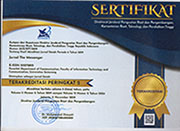Religious Moderation: An Analysis of Understanding, Internet and Social Media Exposure and Social Interaction Systems
Abstract
Introduction: Religious moderation is launched because it concerns the order of life of the nation and state, where the internet and social media become a platform for any dynamic public discussion and change perspectives and practices in religious harmony. This study examines access to information about religious moderation through the internet and social media (WhatsApp, Instagram, Facebook, Twitter, Line) as the most widely used platforms in Indonesia and the influence of exposure to its content on understanding and the system of relational interaction among university students.
Methods: Explanatory quantitative survey method with factor and regression analysis to explain the dominant factors and the magnitude of the influence of exposure to religious moderation content on students' understanding and interpersonal relationships.
Findings: That student quite often access information about religious moderation on social media through WhatsApp and Instagram. Issues related to national commitment, tolerance, intolerance, violence, radicalism, government attitudes, regulations and their consequences, correlate with the dogmatism factor. The findings show that it is not easy to change one's religious beliefs, and this should be respected. So what remains is to find common ground and give a positive impression so that social interactions continue to run normally.
Originality: The research presents a novelty in the perspective of communication science on the understanding of religious moderation and its correlation with the interpersonal interaction system in students from non-religious campuses. Where previously religious moderation was widely studied in the perspective of language, civilization, humanity, culture, education and with subjects from religious campuses, especially Islam.
Keywords
Full Text:
PDFReferences
Abdullah, A. H., & Nento, S. (2021). Constructing Religious Moderation in Islamic Higher Education. Al-Ulum, 21(1), 166–186. https://doi.org/https://doi.org/10.30603/au.v21i1.2084
Agis, A., Diaz, M., Rustam, G., Islam, U., & Sunan, N. (2018). Islam Nusantara : Moderasi Islam Di Indonesia. 3(2), 153–168. https://doi.org/DOI:10.21580/jish.32.3160
Al Ali, N. M., Alkhateeb, E., Jaradat, D., & Bashtawi, M. (2021). Social media use among university students in Jordan and its impact on their dietary habits and physical activity. Cogent Education, 8(1), 1993519. https://doi.org/10.1080/2331186X.2021.1993519
Alamri, M. M. (2019). Undergraduate Students’ Perceptions toward Social Media Usage and Academic Performance: A Study from Saudi Arabia. International Journal of Emerging Technologies in Learning (IJET), 14(03), 61–79. https://doi.org/https://doi.org/10.3991/ijet.v14i03.9340
Ali, N. (2020). Measuring Religious Moderation Among Muslim Students at Public Colleges in Kalimantan Facing Disruption Era. INFERENSI: Jurnal Penelitian Sosial Keagamaan. https://doi.org/10.18326/infsl3.v14i1.1-24
Amrullah, H. F., Ali, M. N. S., & Sukimi, M. F. (2019). Information-Seeking Behavior of College Students on Religious Tolerance through Social Media. ISLÓMIYYÓT, 41(2), 9–15. https://doi.org/(https://doi.org/10.17576/islamiyyat-2019-4001-02
Anwar, F., & Haq, I. (2019). Religious Moderation Campaign Through Social Media AtMulticultural Communities. KURIOSITAS: Media Komunikasi Sosial Dan Keagamaan, 12(2), 177–187. https://doi.org/https://doi.org/10.35905/kur.v12i2.1392
Arifinsyah, A., Andy, S., & Damanik, A. (2020). The urgency of religious moderation in preventing radicalism in Indonesia. ESENSIA: Jurnal Ilmu-Ilmu Ushuluddin, 21(1), 91–108. https://doi.org/https://doi.org/10.14421/esensia.v21i1.2199
Ashrianto, P. D., & Yustitia, S. (2020). The Use of Social Media in Searching for Information about Papua. Jurnal The Messenger, 12(2), 122. https://doi.org/10.26623/themessenger.v12i2.1939
Badan Pusat Statistik. (2017). Jumlah Perguruan Tinggi, Mahasiswa, dan Tenaga Edukatif (Negeri dan Swasta) di Bawah Kementrian Pendidikan dan Kebudayaan Menurut Provinsi tahun ajaran 2013/2014-2014/2015. Bps.Go.Id.
Bashir, I., Malik, A., & Mahmood, K. (2021). Social media use and information-sharing behaviour of university students. IFLA Journal, 47(4), 481–492. https://doi.org/10.1177/0340035221991564
Briandana, R., & Dwityas, N. A. (2019). Media Literacy: An Analysis of Social Media Usage among Millennials. International Journal of English Literature and Social Sciences, 4(2), 488–496. https://doi.org/10.22161/ijels.4.2.44
Carr, C. T., & Hayes, R. A. (2015). Social Media: Defining, Developing, and Divining. Atlantic Journal of Communication, 23(1), 46–65. https://doi.org/10.1080/15456870.2015.972282
Chen, H.-C., Wang, J.-Y., Lin, Y.-L., & Yang, S.-Y. (2020). Association of Internet Addiction with Family Functionality, Depression, Self-Efficacy and Self-Esteem among Early Adolescents. In International Journal of Environmental Research and Public Health (Vol. 17, Issue 23). https://doi.org/10.3390/ijerph17238820
Cuello-Garcia, C., Pérez-Gaxiola, G., & van Amelsvoort, L. (2020). Social media can have an impact on how we manage and investigate the COVID-19 pandemic. Journal of Clinical Epodemiology, 127, 198–202. https://doi.org/https://doi.org/10.1016/j.jclinepi.2020.06.028
Cushman, D. P. (1985). Communication in Interpersonal Relationship. State University of New York Press, Albany.
de Vreese, C. H., & Neijens, P. (2016). Measuring Media Exposure in a Changing Communications Environment. In Communication Methods and Measures. https://doi.org/10.1080/19312458.2016.1150441
Dumford, A. D., Miller, A. L., Lee, C. H. K., & Caskie, A. (2023). Social media usage in relation to their peers: Comparing male and female college students’ perceptions. Computers and Education Open, 4, 100121. https://doi.org/https://doi.org/10.1016/j.caeo.2022.100121
Ekawati, E., Suparta, M., Sirin, K., Maftuhah, M., & Pifianti, A. (2019). Moderation of Higher Education Curriculum in Religious Deradicalization in Indonesia. TARBIYA: Journal of Education in Muslim Society. https://doi.org/10.15408/tjems.v6i2.14886
Fauzi, A. (2018). Moderasi Islam, Untuk Peradaban Dan Kemanusiaan. Jurnal Islam Nusantara, 2(2), 232. https://doi.org/10.33852/jurnalin.v2i2.101
Febriani, S. R., & Ritonga, A. W. (2022). The Perception of Millennial Generation on Religious Moderation through Social Media in the Digital Era. Millah: Jurnal Studi Agama, 21(2), 313–334. https://doi.org/DOI: 10.20885/millah.vol21.iss2.art1
Giselle Vincett, Sarah Dunlop, K. S. and A. Y. (2015). Young People and Religion and Spirituality in Europe: A Complex Picture. In J. Wyn & H. Cahill (Eds.), Handbook of Children and Youth Studies (Issue March 2018). Springer Singapore. https://doi.org/10.1007/978-981-4451-15-4
Gong, J., Zanuddin, H., Hou, W., & Xu, J. (2021). Media attention, dependency, self-efficacy, and prosocial behaviours during the outbreak of COVID-19: A constructive journalism perspective. Global Media and China, 7(1), 81–98. https://doi.org/10.1177/20594364211021331
Grover, P., Kar, A. K., & Dwivedi, Y. (2022). The evolution of social media influence - A literature review and research agenda. International Journal of Information Management Data Insights, 2(2), 100116. https://doi.org/https://doi.org/10.1016/j.jjimei.2022.100116
Hamid, S., Bukhari, S., Ravana, S. D., Norman, A., & Ijab, M. (2016). Role of social media in information-seeking behaviour of international students: A systematic literature review. Aslib Journal of Information Management, 68, 643–666. https://doi.org/10.1108/AJIM-03-2016-0031
Hanapi, M. S. (2014). The Wasatiyyah (Moderation) Concept in Islamic Epistemology: A Case Study of its Implementation in Malaysia. International Journal of Humanities and Social Science, 4(9(1)), 51–62.
Harianto, E. (2022). Publication Trends of Journal Articles about Religious Moderation in Recent Years: Bibliometric Analysis. Islamic Review: Jurnal Riset Dan Kajian Keislaman, 11(2), 125–138. https://doi.org/10.35878/islamicreview.v11.i2.375
Haryani, E. (2020). Pendidikan Moderasi Beragama Untuk Generasi Milenia: Studi Kasus Lone Wolf” Pada Anak di Medan. EDUKASI: Jurnal Penelitian Pendidikan Agama Dan Keagamaan, 18(2), 145–158. https://doi.org/10.32729/edukasi.v18i2.710
Haryanto, A. T. (2019). Pengguna Internet Indonesia Didominasi Milenial. Inet.Detik.Com.
Hawi, N. S., & Samaha, M. (2016). The Relations Among Social Media Addiction, Self-Esteem, and Life Satisfaction in University Students. Social Science Computer Review, 35(5), 576–586. https://doi.org/10.1177/0894439316660340
Henriques, J., & Ferreira, J. (2023). Searching for associations between social media trending topics and organizations. Multimedia Tools and Applications, 82(6), 9277–9302. https://doi.org/10.1007/s11042-022-13438-2
Https://kbbi.kemdikbud.go.id. (2016). KBBI Daring. In Badan Pengembangan dan Pembinaan Bahasa, Kementerian Pendidikan dan Kebudayaan Republik Indonesi.
Hu, X., Cheng, S., & Hu, H. (2022). Religiousness predicts quality of university life among university students with different religion types. Journal of Beliefs & Values, 43(3), 285–300. https://doi.org/10.1080/13617672.2021.1936366
Huang, H. (2016). Media use, environmental beliefs, self-efficacy, and pro-environmental behavior. Journal of Business Research, 69(6), 2206–2212. https://doi.org/https://doi.org/10.1016/j.jbusres.2015.12.031
Indrawan, I. (2016). Pendidikan Karakter Dalam Perspektif Islam. Al-Afkar : Jurnal Keislaman & Peradaban, 2(1). https://doi.org/10.28944/afkar.v2i1.90
Infante, Dominic A. Rance, Andrew S, dan Womack, D. F. (2003). Building Communication Theory. Waveland Pr Inc; 4th edition (January 1, 2003).
Islam, T., & Khatun, A. (2015). “Islamic Moderation” in Perspectives: A Comparison Between Oriental and Occidental Scholarships. International Journal of Nusantara Islam, 3(2), 69–78. https://doi.org/10.15575/ijni.v3i2.1414
Junaedi, E. (2019). Inilah Moderasi Beragama Perspektif Kemenag. Harmoni, 18(2), 182–186. https://doi.org/10.32488/harmoni.v18i2.414
Kansong, U., Sunarwinadi, I. R., & Triputra, P. (2022). Religious Populism in Mainstream Media between Indonesia and India. Jurnal The Messenger, 14(1), 1–16. https://doi.org/http://dx.doi.org/10.26623/themessenger.v14i1.4193
Karaşar, B., & Baytemir, K. (2018). Need for social approval and happiness in college students: The mediation role of social anxiety. Universal Journal of Educational Research, 6(5), 919–927. https://doi.org/10.13189/ujer.2018.060513
Kawangung, Y. (2019). Religious moderation discourse in plurality of social harmony in Indonesia. International Journal of Social Sciences and Humanities, 3(1), 160–170. https://doi.org/10.29332/ijssh.v3n1.277
Kemenag RI. (2019). Moderasi Beragama. https://doi.org/10.1017/CBO9781107415324.004
Kim, B., & Kim, Y. (2017). College students’ social media use and communication network heterogeneity: Implications for social capital and subjective well-being. Computers in Human Behavior, 73, 620–628. https://doi.org/https://doi.org/10.1016/j.chb.2017.03.033
Kim, K.-S., Sin, S.-C. J., & Tsai, T.-I. (2014). Individual Differences in Social Media Use for Information Seeking. The Journal of Academic Librarianship, 40(2), 171–178. https://doi.org/https://doi.org/10.1016/j.acalib.2014.03.001
Kosasih, E. (2019). Literasi Media Sosial dalam Pemasyarakatan Sikap Moderasi Beragama. Jurnal Bimas Islam. https://doi.org/10.37302/jbi.v12i2.118
Li, X. (2018). Media Exposure, Perceived Efficacy, and Protective Behaviors in a Public Health Emergency. International Journal of Communication, 12(0), 20.
Manshur, F. M., & Husni, H. (2020). Promoting Religious Moderation through Literary-based Learning: A Quasi-Experimental Study. International Journal of Advanced Science and Technology, 29(6), 8113–8119.
Masmuhah, M. (2017). Indonesia’S Moderate Islam Countering Religious Radicalism and Political Violence. IJASOS- International E-Journal of Advances in Social Sciences, III(8), 722–727. https://doi.org/10.18769/ijasos.342158
Menski, W. (2018). Religion, Governance and the Need for Plurality-Conscious Moderation. South Asia Research, 38(1), 92–102. https://doi.org/10.1177/0262728017725647
Mubarok, A. A., & Rustam, D. G. (2019). Islam nusantara: Moderasi islam di Indonesia. Journal of Islamic Studies and Humanities, 3(2), 153–168. https://doi.org/10.21580/jish.32.3160
Nasir, M., & Rijal, M. K. (2021). Keeping the middle path: mainstreaming religious moderation through Islamic higher education institutions in Indonesia. Indonesian Journal of Islam and Muslim Societies, 11(2), 213–241. https://doi.org/10.18326/ijims.v11i2. 213-241
Natalia, A. (2016). Faktor-faktor penyebab radikalisme dalam beragama (Kajian Sosiologi Terhadap Pluralisme agama di Indonesia). 11(1).
O’Dea, T. F. (2000). Sosiologi Agama Suatu Pengenalan Awal. Rajawali Pers.
Oliveira, G. da S., Pellegrini, G., Araújo, L. A. L., & Bizzo, N. (2022). Acceptance of evolution by high school students: Is religion the key factor? PLOS ONE, 17(9), e0273929.
Özkent, Y. (2022). Social media usage to share information in communication journals: An analysis of social media activity and article citations. PloS One, 17(2), 1–11. https://doi.org/https://doi.org/10.1371/journal.pone.0263725
Prihatin, B. (2020). Peran Madrasah Dalam Membangun Moderasi Agama Di Indonesia Di Era Milineal. Jurnal Pendidikan Dan Pembelajaran.
Purwanto, Y., Qowaid, Q., Ma’rifataini, L., & Fauzi, R. (2019). Internalisasi Nilai Moderasi Melalui Pendidikan Agama Islam di Perguruan Tinggi Umum. EDUKASI: Jurnal Penelitian Pendidikan Agama Dan Keagamaan, 17(2), 110–124. https://doi.org/10.32729/edukasi.v17i2.605
Rahman, Y., Walid, K. Al, & Humaidi, H. (2022). CRITICAL THINKING AND RELIGIOUS MODERATION: Instilling Religiously Moderate Values through the Teaching of Islamic Philosophy in Indonesia. Journal of Indonesian Islam, 16(1), 49–74. https://doi.org/10.15642/JIIS.2022.16.1.49-74
Ropi, I. (2019). Whither Religious Moderation? The State and Management of Religious Affairs in Contemporary Indonesia. Studia Islamika, 26(3), 597–601. https://doi.org/10.36712/sdi.v26i3.14055
Rydz, E., & Romaneczko, J. (2022). Identity Styles and Readiness to Enter into Interreligious Dialogue: The Moderating Function of Religiosity. In Religions (Vol. 13, Issue 11). https://doi.org/10.3390/rel13111046
Saputra, A. (2019). Survey Penggunaan Media Sosial di Kalangan Mahasiswa Kota Padang Menggunakan Teori Uses and Gratification. Jurnal Dokumentasi Dan Informasi, 40(2), 207–216. https://doi.org/DOI: 10.14203/j.baca.v40i2.476
Setiawan, Y. B., Sarwono, B. K., Asteria, D., & Sunarto, S. (2022). Perpetuation of Stigmatization of Minority Groups through Convergence of Content on Streaming and Social Media. Jurnal The Messenger, 14(1), 17–35. https://doi.org/http://dx.doi.org/10.26623/themessenger.v14i1.4158
Smeer, Z. B., & Rosyidah, I. (2021). Religious Moderation in Islamic Education Learning to Counter Radicalism: Study at SMAN 1 Sugihwaras Bojonegoro. Ulul Albab: Jurnal Studi Islam, 22(1), 176–202. https://doi.org/https://doi.org/10.18860/ua.v22i1.11837
Sobur, A. (2013). Psikologi Umum Dalam Lintasan Sejarah. Pustaka Setia.
Subchi, I., Zulkifli, Z., Latifa, R., & Sa’diyah, S. (2022). Religious Moderation in Indonesian Muslims. In Religions (Vol. 13, Issue 5). https://doi.org/10.3390/rel13050451
Supratman, L. P. (2018). Penggunaan Media Sosial oleh Digital Native. Jurnal Ilmu Komunikasi, 15(1), 47–60. https://doi.org/https://doi.org/10.24002/jik.v15i1.1243
Sutrisno, E. (2019). Aktualisasi Moderasi Beragama di Lembaga Pendidikan. Jurnal Bimas Islam. https://doi.org/10.37302/jbi.v12i2.113
Takwin, B., & Setiawan, T. (2023). Collective Efficacy as the Conditional Effect of the Relationship between Religiocentrism and Support for Interreligious Violence. In Religions (Vol. 14, Issue 1). https://doi.org/10.3390/rel14010056
Umiarso, & Qorib, M. (2022). The Practice of Religious Moderation Based on Theo-anthropocentric in Indonesian Islamic Boarding Schools: A Phenomenological Study. Jurnal Iqra’ : Kajian Ilmu Pendidikan, 7(2), 183–193. https://doi.org/https://doi.org/10.25217/ji.v7i2.2629
Wang, Y., McKee, M., Torbica, A., & Stuckler, D. (2019). Systematic Literature Review on the Spread of Health-related Misinformation on Social Media. Social Science & Medicine, 240, 112552. https://doi.org/https://doi.org/10.1016/j.socscimed.2019.112552
Zamimah, I. (2018). Moderatisme Islam Dalam Konteks Keindonesiaan. Jurnal Al-Fanar, 1(1), 75–90. https://doi.org/10.33511/alfanar.v1i1.12
Zhafira, A. (2017). Efek moderasi kepercayaan politik terhadap hubungan antara religiusitas Islam dan intoleransi politik. Jurnal Psikologi Sosial. https://doi.org/10.7454/jps.2017.11
Zuhdi, M. (2018). Challenging moderate muslims: Indonesia’s muslim schools in the midst of religious conservatism. MDPI Religions, 9(310), 1–15. https://doi.org/10.3390/rel9100310
DOI: http://dx.doi.org/10.26623/themessenger.v14i2.2812
Refbacks
- There are currently no refbacks.
Copyright (c) 2022 Jurnal The Messenger
View My Stats [Jurnal The Messenger] is an International Scientific Journal, Published by the Department of Communication, Faculty of Information Technology and Communication, Universitas Semarang (Central Java, Indonesia). It is licensed under a Creative Commons Attribution 4.0 International License.



_11.jpg)




_BARCODE.jpg)
_BARCODE1.jpg)


5.png)










2.png)





